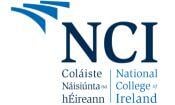
Deciding between a full-time or part-time postgraduate programme is a significant decision to make, with many factors that you will need to be take into consideration.
Whether you recently graduated from your undergraduate course or want to return to education after several years in the workforce, your choice of postgraduate programme and its delivery will impact your academic performance, work-life balance, and career trajectory so it is important that you make the right decision for you.
If you are unsure of which option is best for you, don’t worry, NCI has you covered. We have highlighted below just some of the factors that you should consider when making your choice on which route to go: Full-Time or Part-Time.
1. Time Commitment
- Full-time: These courses run similarly to undergraduate programmes in that students are typically required to be available to attend lectures, whether online or on campus, from Monday to Friday.
Due to the significant weekly time commitment with these programmes, students are unlikely to hold a full-time job whilst studying. However, the programmes are often delivered in just one academic year, allowing you to earn your degree quickly and ensure a fast entry into the jobs market. - Part-Time: PT courses are usually delivered 1-3 evenings a week, meaning students have the option to continue working full-time whilst studying. This flexibility can appeal to students as it means they can continue to earn an income and allows you to immediately put the skills they are learning in the classroom into their work environment.
However, PT programmes are normally delivered over 2 years, meaning it will take students longer to earn their degree versus the FT programme.
For a full list of the postgraduate courses available at NCI, then check out our Postgraduate & Part-Time Prospectus.
2. Financial Requirements
- Full-Time: Your current financial situation may dictate which postgraduate route is more suitable for you. For example, students applying for FT postgraduate courses may be eligible for one of several postgraduate scholarships that NCI offers to outstanding students, both from NCI and other third level institutions. Further information on these can be found on NCI Scholarships & Discounts.
Additional costs that you may need to consider for a FT programme are commuting costs and rent, should you choose to move closer to the college campus. - Part-Time: PT students will not need to consider commuting costs as much, as they will be on campus less often their FT counterparts.
However, with some lectures delivered online, students will need to consider investing in a suitable laptop and possibly some additional items to create a comfortable home office environment (additional screens, desk, comfortable and ergonomic chair for example).
For a full breakdown of fees and how they can be paid, please see NCI Fees and Grants for further information.
3. Career Considerations
- Full-Time: As mentioned previously, due to the time commitment that comes with FT programmes, students are unlikely to work a full-time job when undertaking a FT postgraduate programme.
Students interested in this route will need to take this into consideration as they will essentially be “pausing” their professional career whilst they return to college and upskill or develop new skill. Also, they may need to find a new source of income to pay existing bills/financial commitments whilst studying full-time.
However, a PT postgraduate will often only take 1 academic year, meaning students can acquire their degree and make a fast return to the workforce, where they will be able to showcase their new skills and expertise.
Postgraduate programmes also allow students to meet like-minded individuals and guest speakers, giving them exposure to new ideas and ways of thinking which may prove beneficial in their future career. - Part-Time: PT postgraduate programmes provide greater flexibility to students, allowing them to study and continue to work their jobs simultaneously.
This can appeal to students who want to “earn and learn” – continuing to receive an income while developing new skills.
Students should take into consideration that PT programmes can be intensive, and coupled with working a full-time job, that burnout is a very real factor if workload is not managed appropriately.
We’ve outlined some ways to avoid this happening in our blog “How to Balance Work and Study as a Part-time Student”, which you may find beneficial.
4. Personal Responsibilities
- Full-Time: FT postgraduate programmes can be demanding and require a high level of time management. Between the course workload, assignments and possibly commuting to campus, students interested in this route must be ready to commit their full focus and attention to the single academic year.
This makes FT programme more suitable for individuals who might not have significant family or personal responsibilities, which may be negatively impacted by the study. - Part-Time: Those who do have significant family or personal responsibilities, such as being a parent or caregiver, may appreciate the more flexible approach that comes with PT programmes.
As PT programmes may only require you to attend lectures a couple of evenings each week, this gives students a more balanced approach to studies and personal life, allowing them to continue their pre-studies routine with minimal changes.
Choosing the right postgraduate programme may not be a straightforward choice for you but luckily NCI has plenty of resources to help you make your decision. We organise Open Evening events throughout the year, both online and on-campus, where you will have the opportunity to talk to lecturers who can advise on which programme is best for you.
Visit NCI events to see when our next event is taking place.










